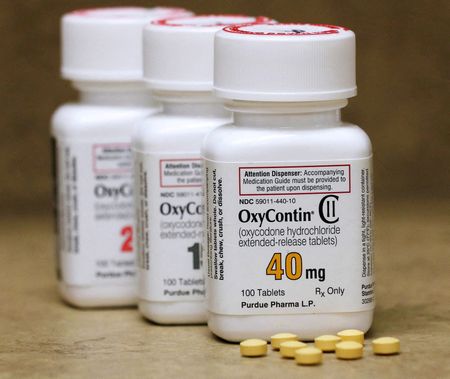 1
1 1
1

By Tom Hals and Dietrich Knauth
(Reuters) – Victims of America’s opioid addiction epidemic will confront in court on Thursday the Sackler family members who own OxyContin-maker Purdue Pharma, in an attempt to force them to face their role in a crisis that claimed 500,000 overdose deaths.
The two-hour hearing conducted by Zoom stemmed from a $6 billion settlement between the Sacklers and state attorneys general which could resolve claims over the family’s role in the crisis without taking them to trial.
The Sacklers will not be able to respond during the hearing.
“I think for people who are sharing their stories tomorrow, it will be a relief to be able to express those feelings of sadness and anger they have had to hold inside for a long time and to express them directly to the perpetrators of this epidemic,” said Dita Bhargava, whose son died from a fentanyl overdose.
It was unclear who would be chosen to speak but the official committee of creditors in the bankruptcy includes thousands of people who filed personal injury claims against Purdue Pharma.
At least one member will attend from the family of the late Raymond Sackler and one from the family of the late Mortimer Sackler, two of the three brothers, all doctors, who purchased Purdue’s predecessor in 1952.
Sackler family members did not respond to requests for comment.
Members of the Sackler family have denied wrongdoing. They said last week in a statement that they “sincerely regret” that OxyContin “unexpectedly became part of an opioid crisis.”
Richard Sackler told the bankruptcy court in August that the family did not bear responsibility for the crisis. At the same hearing, his son David Sackler testified that the family has a “moral responsibility” to help curb the opioid epidemic.
Both served as Purdue board members along with several other members of the family and have been named in lawsuits alleging they directed deceptive marketing of addictive painkillers.
Purdue Pharma filed for Chapter 11 bankruptcy in 2019 and the court extended to the Sacklers legal protections from being sued, one of the main benefits of seeking bankruptcy, despite the family members never filing for bankruptcy.
That controversial protection is being challenged in court by the U.S. Department of Justice.
The $6 billion legal settlement also requires millions of pages of internal company documents be made public.
(Reporting by Tom Hals in Wilmington, Delaware; editing by Grant McCool)